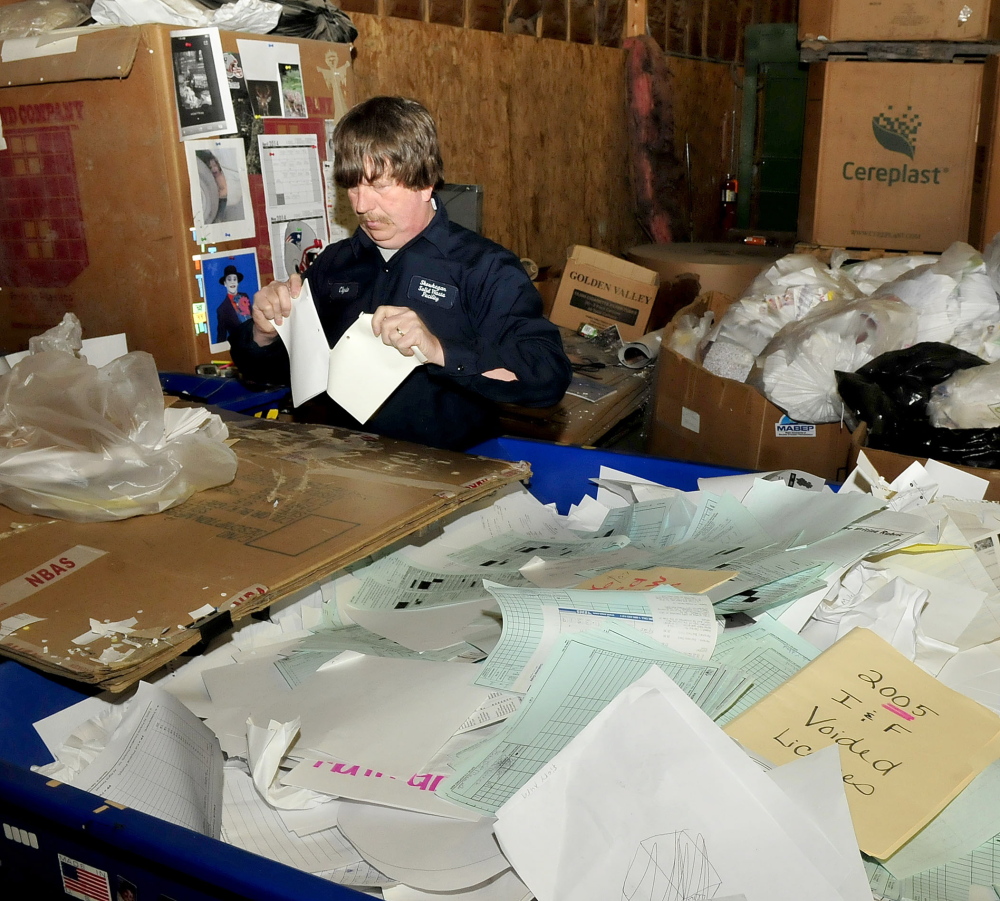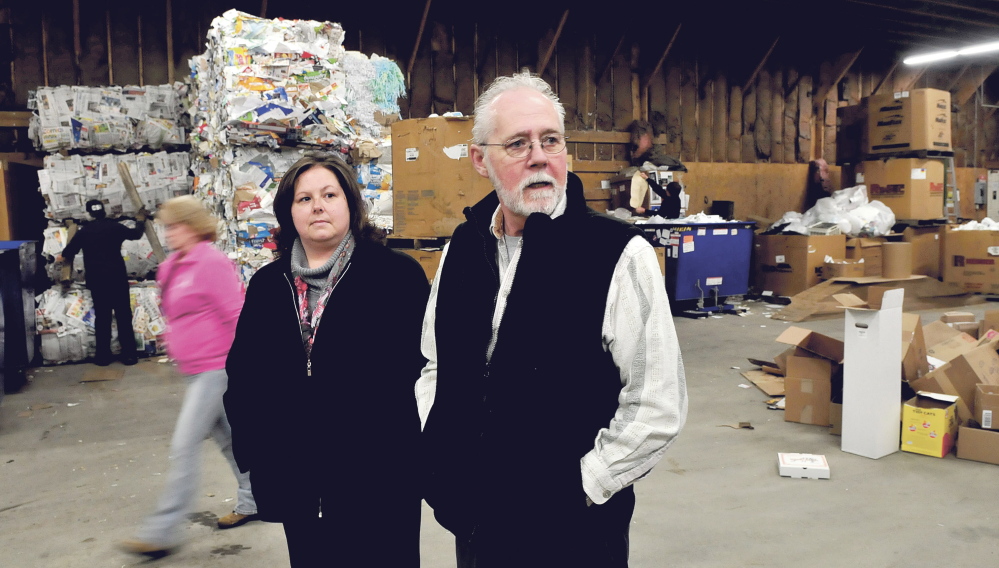SKOWHEGAN — The town of Cornville no longer will have to truck its recycled cardboard and paper to a handling center in Dexter because employees from the Skowhegan Recycling Center will now take the baled material and pay the town $123.50 for every ton.
Skowhegan gets paid $125 per ton of paper or cardboard through an agreement with Casella Waste Systems, which finds markets for the material. Cornville will pay a $1.50 handling fee to Skowhegan and gets to keep the rest, said Randall Gray, Skowhegan’s solid waste management supervisor.
Skowhegan already takes recyclable material from the Athens Community School, the Cornville Regional Charter School and all the schools in the Skowhegan-based School Administrative 54.
The agreements are well worth the effort, Gray said.
“That’s the whole purpose of our program — we cover our costs and we’re doing what we believe is right — recycling,” Gray said. “And it gives a small town a way to market their material.”
The Skowhegan Board of Selectmen approved the agreement with Cornville last week. Cornville First Selectman Melvin Blaisdell said his board will vote on the matter at their next meeting Monday night.
“We’ll save on trucking — probably $1,200 a year,” Blaisdell said. “I think selectmen will approve it Monday night.”
Gray said Skowhegan will take all of Cornville’s baled newspaper and magazines, cardboard and plastics. He said Skowhegan began taking material from the Athens school about three years ago and from the charter school when it opened two years ago.
Recycling center employee Al White, who lives in Athens, picks up the material to be recycled at the Athens school and hauls it to Skowhegan, where it all is added to Skowhegan’s stream of recycling. In Cornville, recycling manager Ralph Collins will deliver the baled material to the Skowhegan center, where it will be offloaded.
“Anything they have, we take in — tin cans, cardboard, office paper, mixed paper and plastics,” he said. “If we reuse it, if we resell it, if we give it away, if we bale it and sell it, it’s not costing the taxpayers a dime. It shows that their tax dollars are working pretty hard for them. Everyone wants to do the easy thing, it takes work to do the hard thing, but it’s the right thing to do.”
Gray said White and administrative assistant Cynthia Kirk go to the Athens and Cornville schools once or twice a year to talk to the students about the importance of recycling. Totes also are donated to the schools to encourage recycling.
“They educate them about recycling — they make it fun with games and with little gifts,” he said. “Hopefully they grasp onto this idea, because it is the right way to handle material — turn it into a worthwhile product — it’s going to be reused. Why throw stuff away and landfill it?”
In 2013, the Skowhegan Recycling Center processed 303 tons of cardboard, 92 tons of newspaper, 54 tons of mixed paper, along with many more tons of metal, plastics and glass. The center also sold or reused 50 tons of material deposited at the transfer station, according to Gray.
Gray said the town made $63,000 in profits from recycled material in 2013, plus the town saved another $48,000 in avoided costs of landfilling material that was recycled.
“More recycling equals less taxes and it also means less waste,” he said of the estimated $111,000 in savings.
Gray said the money is used to offset the $800,000 annual operating budget at the center and the town transfer station, also on site.
“That’s money we got back from people’s trash,” he said. “I believe it’s a very worthwhile program.”
A University of Maine study in 2012 suggested that Maine was falling short of its goal of recycling at least 50 percent of the trash going to state landfills. A survey of 17 communities concluded that as much as 60 percent of what’s thrown in the trash could have been either recycled or composted.
A team of university students picked through bags of trash to categorize what was being thrown away, the Associated Press reported. The study concluded that about 40 percent was waste, 40 percent could have been composted and 20 percent could have been recycled.
Some communities in Maine have switched to the zero-sort or single-stream recycling, which proponents say encourages recycling by relieving homeowners of the work of separating their recyclables.
Gray said he disagrees with that method of recycling. He said employees at Skowhegan’s recycling center “single sort” every piece of recyclable material. All of the cardboard, newspaper, office paper and plastics is sorted to produce quality and more valuable recycling material, he said.
“I believe we’re getting better recycled material by doing it the way we do,” he said, “plus we get paid for it.”
Doug Harlow — 612-2367 dharlow@centralmaine.com Twitter: @Doug_Harlow
Send questions/comments to the editors.





Success. Please wait for the page to reload. If the page does not reload within 5 seconds, please refresh the page.
Enter your email and password to access comments.
Hi, to comment on stories you must . This profile is in addition to your subscription and website login.
Already have a commenting profile? .
Invalid username/password.
Please check your email to confirm and complete your registration.
Only subscribers are eligible to post comments. Please subscribe or login first for digital access. Here’s why.
Use the form below to reset your password. When you've submitted your account email, we will send an email with a reset code.